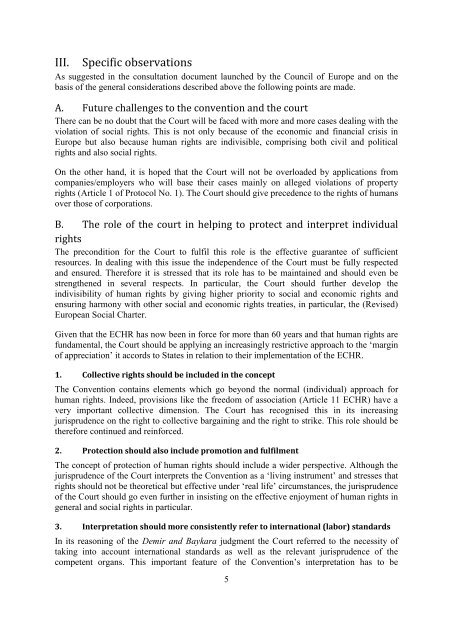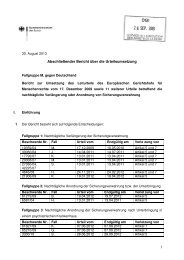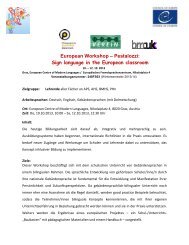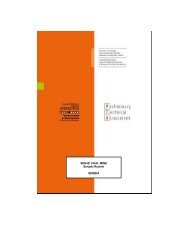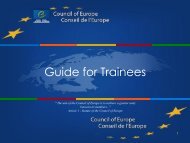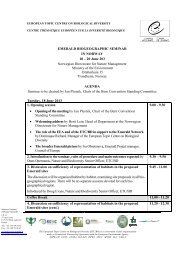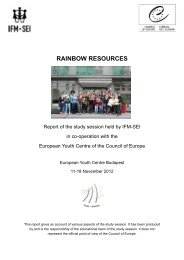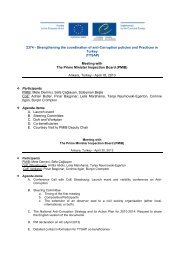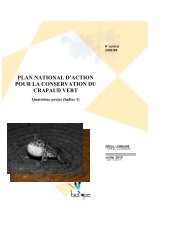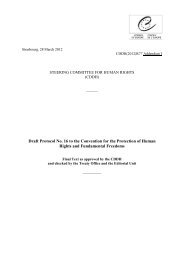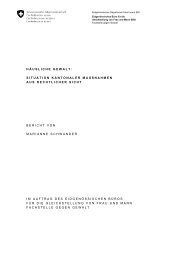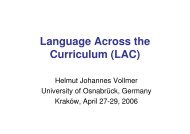Walter, Torsten - Council of Europe
Walter, Torsten - Council of Europe
Walter, Torsten - Council of Europe
Create successful ePaper yourself
Turn your PDF publications into a flip-book with our unique Google optimized e-Paper software.
III.<br />
Specific observations<br />
As suggested in the consultation document launched by the <strong>Council</strong> <strong>of</strong> <strong>Europe</strong> and on the<br />
basis <strong>of</strong> the general considerations described above the following points are made.<br />
A. Future challenges to the convention and the court<br />
There can be no doubt that the Court will be faced with more and more cases dealing with the<br />
violation <strong>of</strong> social rights. This is not only because <strong>of</strong> the economic and financial crisis in<br />
<strong>Europe</strong> but also because human rights are indivisible, comprising both civil and political<br />
rights and also social rights.<br />
On the other hand, it is hoped that the Court will not be overloaded by applications from<br />
companies/employers who will base their cases mainly on alleged violations <strong>of</strong> property<br />
rights (Article 1 <strong>of</strong> Protocol No. 1). The Court should give precedence to the rights <strong>of</strong> humans<br />
over those <strong>of</strong> corporations.<br />
B. The role <strong>of</strong> the court in helping to protect and interpret individual<br />
rights<br />
The precondition for the Court to fulfil this role is the effective guarantee <strong>of</strong> sufficient<br />
resources. In dealing with this issue the independence <strong>of</strong> the Court must be fully respected<br />
and ensured. Therefore it is stressed that its role has to be maintained and should even be<br />
strengthened in several respects. In particular, the Court should further develop the<br />
indivisibility <strong>of</strong> human rights by giving higher priority to social and economic rights and<br />
ensuring harmony with other social and economic rights treaties, in particular, the (Revised)<br />
<strong>Europe</strong>an Social Charter.<br />
Given that the ECHR has now been in force for more than 60 years and that human rights are<br />
fundamental, the Court should be applying an increasingly restrictive approach to the ‘margin<br />
<strong>of</strong> appreciation’ it accords to States in relation to their implementation <strong>of</strong> the ECHR.<br />
1. Collective rights should be included in the concept<br />
The Convention contains elements which go beyond the normal (individual) approach for<br />
human rights. Indeed, provisions like the freedom <strong>of</strong> association (Article 11 ECHR) have a<br />
very important collective dimension. The Court has recognised this in its increasing<br />
jurisprudence on the right to collective bargaining and the right to strike. This role should be<br />
therefore continued and reinforced.<br />
2. Protection should also include promotion and fulfilment<br />
The concept <strong>of</strong> protection <strong>of</strong> human rights should include a wider perspective. Although the<br />
jurisprudence <strong>of</strong> the Court interprets the Convention as a ‘living instrument’ and stresses that<br />
rights should not be theoretical but effective under ‘real life’ circumstances, the jurisprudence<br />
<strong>of</strong> the Court should go even further in insisting on the effective enjoyment <strong>of</strong> human rights in<br />
general and social rights in particular.<br />
3. Interpretation should more consistently refer to international (labor) standards<br />
In its reasoning <strong>of</strong> the Demir and Baykara judgment the Court referred to the necessity <strong>of</strong><br />
taking into account international standards as well as the relevant jurisprudence <strong>of</strong> the<br />
competent organs. This important feature <strong>of</strong> the Convention’s interpretation has to be<br />
5


